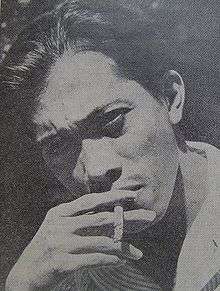Aku (poem)
"Aku" (meaning "Me") is a 1943 Indonesian-language poem by Chairil Anwar. It reflects his individualistic nature and vitality.

Poem
Kalau sampai waktuku |
If my time has come |
Release
Anwar first read "Aku" at the Jakarta Cultural Centre in July 1943.[1] It was then printed in Pemandangan under the title "Semangat" ("Spirit"); according to Indonesian literary documentarian HB Jassin, this was to avoid censorship and to better promote the nascent independence movement.[2] "Aku" has gone on to become Anwar's most celebrated poem.[3]
Indonesian writer Muhammad Balfas notes that one of Anwar's contemporaries, Bung Usman, wrote "Hendak Jadi Orang Besar???" ("So You Want to Be a Big Person???") in response to "Aku".[4] Balfas suggests that Usman was greatly irritated by the "vitality and new way of life" that Anwar showed in the poem.[4]
Analysis

According to Timorese scholar of Indonesian literature A. G. Hadzarmawit Netti, the title "Aku" emphasizes Anwar's individualistic nature, while the temporary title "Semangat" reflects his vitality.[5] Netti analyzes the poem itself as reflecting Anwar's need to control his environment and not be shaped by outside forces, emphasizing the first two stanzas.[5] According to Netti, through controlling his environment, Anwar is able to better protect his freedom and individualistic nature.[6] Netti sees the final line as reflecting Anwar's pride in his individualistic nature, finally surmising that Anwar would have agreed with Ayn Rand's philosophy of objectivism.[7]
Indonesian literary scholar Arief Budiman notes that "Aku" reflects Anwar's worldview, that others should not care for him as he does not care for others.[8] Budiman also notes that the third and fourth stanzas reflect Friedrich Nietzsche's view that suffering makes one stronger.[9]
See also
References
- Footnotes
- Netti 2011, p. 37.
- Jassin 1978, p. 170.
- Djamin & LaJoubert 1972, p. 51.
- Balfas 1976, p. 73.
- Netti 2011, p. 38.
- Netti 2011, p. 39.
- Netti 2011, p. 40.
- Budiman 2007, p. 41.
- Budiman 2007, p. 28.
- Bibliography
- Balfas, Muhammad (1976). "Modern Indonesian Literature in Brief". In L. F., Brakel (ed.). Handbuch der Orientalistik [Handbook of Orientalistics]. 1. Leiden, Netherlands: E. J. Brill. ISBN 978-90-04-04331-2.CS1 maint: ref=harv (link)
- Budiman, Arief (2007). Chairil Anwar: Sebuah Pertemuan [Chairil Anwar: A Meeting] (in Indonesian). Tegal: Wacana Bangsa. ISBN 978-979-23-9918-9.CS1 maint: ref=harv (link)
- Djamin, Nasjah; LaJoubert, Monique (1972). "Les Derniers Moments de Chairil Anwar" [The Last Moments of Chairil Anwar]. Achipel (in French). 4 (4): 49–73. doi:10.3406/arch.1972.1012. Retrieved 30 September 2011.CS1 maint: ref=harv (link)
- Jassin, Hans Bague (1978). Chairil Anwar Pelopor Angkatan 45 [Chairil Anwar, Leader of the 45 Generation] (in Indonesian). Jakarta: Gunung Agung. OCLC 30051301.CS1 maint: ref=harv (link)
- Netti, A. G. Hadzarmawit (2011). Sajak-Sajak Chairil Anwar dalam Kontemplasi [Chairil Anwar's Poems in Contemplation] (in Indonesian). Surabaya: B You Publishing. ISBN 978-979-17911-4-4.CS1 maint: ref=harv (link)